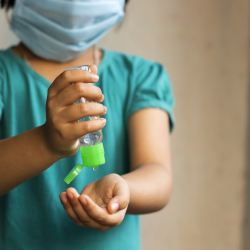Do kids need COVID shots? It's a difficult question to answer, but incendiary commentary has unnecessarily muddied the issue. Let's take a look at what we know so far.
The suggestion that children should be vaccinated against SARS-COV-2 has triggered outrage and anxiety across the internet. The former president has warned parents against immunizing their kids, and the media has called him a “human parasite” for doing so. Meanwhile, anti-vaccine groups have continued to track every reported adverse reaction to the vaccines in hopes of fueling more panic. Here's a recent headline from our friends at Children's Health Defense, for instance: "CDC Admits Teens Vaccinated With Pfizer or Moderna at Higher Risk of Heart Inflammation."
Overheated rhetoric aside, there are two issues we need to address before we can answer the question in the headline. First, is the COVID-19 shot approved for children safe? Second, will vaccinating children help prevent the spread of the virus? The short answers are “yes” and “yes, but ...”
As ACSH's Dr. Chuck Dinerstein pointed out, the situation is messy because there are no clean age categories. In some studies, a child is anyone under 20, in others 16 or 12. They are all developmentally different, and using a varying set of ages is really the same problem as treating children as small adults. This has prompted some experts to take a more cautious stance on pediatric vaccination for the moment. With these qualifications in mind, let's dive into the data and see if we can get a better sense of what's going on.
Heart inflammation in vaccinated teens
The FDA's decision to approve the Pfizer-BioNTech shot for children over 12 has spurred some pushback following several hundred reports of myocarditis (inflammation of the heart muscle) in teenagers. According to pediatric infectious disease specialist Dr. Paul Offit, the link between Pfizer's shot and heart inflammation is likely real. The CDC is about to review these cases to see if it can confirm the relationship, which the agency typically does when potentially serious vaccine adverse events surface.
But we're talking about a very rare, treatable reaction. As Dr. Ben Locwin, who has advised on the federal and regional COVID-19 vaccine rollouts, told ACSH by email:
It's important to note that the risk for myocarditis was detected when the vaccine data were sub-stratified—and when looking at only those aged 16-39, the risk after the second dose (mRNA) of myocarditis was about 1:50,000. A COVID-19 infection which can cause MIS-C [ multisystem inflammatory syndrome] can also lead to myocarditis on its own, naturally. That's why it's important to appraise the risks of infection vs. vaccination by age strata.
When we evaluate the risks of infection vs. vaccination, we get a clearer picture of the situation. The virus itself has caused MIS-C in one in 1,000 children, characterized by severe inflammation of the heart, lungs, blood vessels, kidneys, digestive system, brain, skin, or eyes. Moreover, children (ages 12-15) who received both doses of the Pfizer-BioNTech shot generally experienced the same mild symptoms as those 16 and older. The American Academy of Pediatrics (AAP) got to the heart of the matter, pointing out that
More than 163 million people in the U.S. have received at least one dose of COVID-19 vaccine, including just over 4.5 million adolescents ages 12-17, CDC data show. There were 'relatively few' cases of myocarditis after vaccination …
Do children spread the virus?
The above calculus suggests that children are better off getting a shot than risking infection, though there may be an age cutoff where that's no longer the case. For instance, the AAP recommends COVID-19 vaccines for teenagers, but it has also noted that children face a far lower risk of infection and severe symptoms and are less likely to transmit SARS-COV-2:
One surprising aspect of this pandemic is that children appear to be infected … far less frequently than adults and, when infected, typically have mild symptoms … Almost 6 months into the pandemic, accumulating evidence and collective experience argue that children, particularly school-aged children, are far less important drivers of SARS-CoV-2 transmission than adults.
A meta-analysis of 32 studies published the following month tentatively reached the same conclusion, with the authors explaining that “available studies suggest children and adolescents play a lesser role in transmission of SARS-CoV-2.” Those analyses are from relatively early in the pandemic, but more recent research seems to confirm their results. A February 2021 study reported that "the susceptibility of children (under 20 years old) is 43% ... of the susceptibility of adults. The infectivity of children was estimated to be 63% ... relative to that of adults. The researchers concluded:
Our result concerning the lower susceptibility of children is in agreement with the result of Davies et al. [published in June 2020] who estimated that children under the age of 20 have a level of susceptibility half that of adults.
An April 2021 study likewise found “that children are not only less likely to develop severe disease courses but also are less susceptible and less likely to transmit SARS-CoV-2.”
So, where exactly is the vaccine efficacy cutoff described above? “Maybe it's 8, or 12, or 15,” Locwin added. “It really just requires a couple simple statistical analyses and comparisons to existing data from infection in children.” A recent study conducted in Israel that evaluated the impact of school reopening in November 2020 suggests it may be 10 years old. The researchers found that children up to the age of nine did not have “substantial rates of SARS-CoV-2 infection during school attendance periods,” suggesting that they also “did not have a substantial role in COVID-19 spread either during this period.”
The trouble is that we're aiming at a moving target; new data come in and force us to regularly reassess the situation. For now, though, it seems reasonable to say that the Pfizer-BioNTech shot poses minimal risk to everyone it's been approved for, compared to SARS-COV-2 infection.

